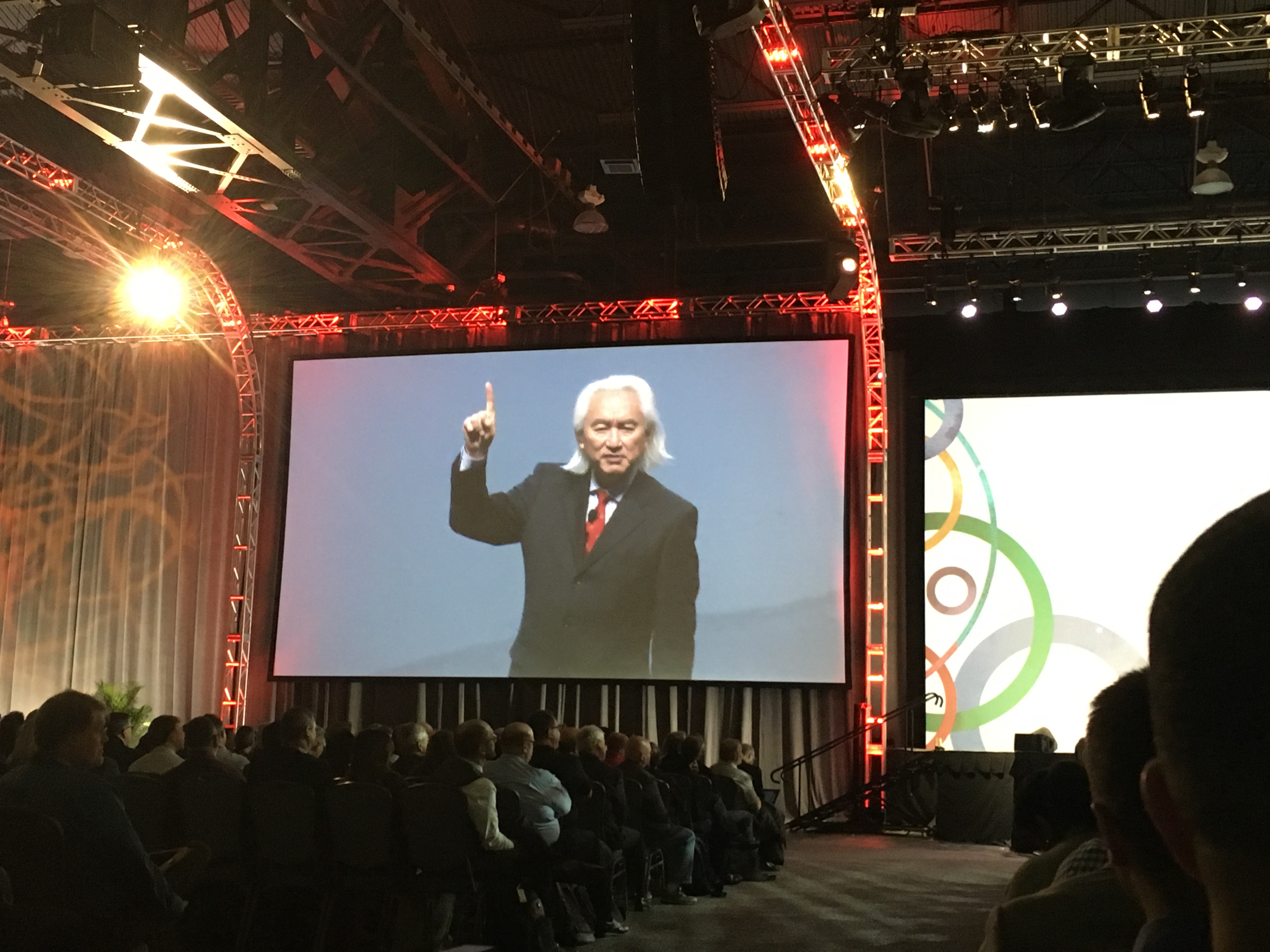“The jobs of the future will be those that focus on intellectual capitalism, not commodity capitalism,” said Futurist, Physicist and Bestselling Author Michio Kaku during the recent 2017 EDUCAUSE conference keynote, held in Philadelphia, Pa.
This was the big reveal to the thousands of EDUCAUSE attendees ranging from college and university faculty to CIOs, and from some of the world’s leading tech companies to some of the country’s most prominent higher ed provosts and presidents—all anxiously awaiting what the crystal ball of the postsecondary future had to say through Kaku’s educated guess.
The Good News
Kaku began his keynote by addressing what he says is the number one question he’s asked about higher education: ‘Is it worth it?’
“I’m happy to tell this crowd that the numbers show that of the 30 percent of the population that has a college degree, those 30 percent also have the white-collar jobs with livable salaries.” So society as it stands today still values the college degree, he explained.
But…the way of things is changing, mainly due to affordability issues and the rapidly shifting economy. And if colleges and universities want to survive this adaptation, the skills today’s students are required to learn must begin adapting as well.
Why Old Ways Won’t Work
“I want to begin by telling you a story about my daughter when she was younger,” said Kaku. “She told me she was going to take the New York Regents Exam in Geology. I was thrilled. I thought: Yes. She will learn all about plate tectonics and rock formations, all about measurements of time through formations. In other words, the concepts that characterize the science of Geology.”
Unfortunately for Kaku and his daughter, this was not the case. “Almost the entire exam asked her to name the composition of crystals from memory. It was a test based purely on memorization,” he noted. “And I thought, she could easily look this up on the internet. This is teaching her nothing about what it means to be a geologist.”
Which brought Kaku to two critical thoughts about education today: 1) In the internet and digital age, where information is at the population’s fingertips anytime, anywhere, learning based on memorization and not concepts is incredibly outdated; and 2) “Junior high school is the biggest enemy of science today.”
“Every one of us is born a scientist,” he said. “We ask questions all the time about where we come from and why we’re here. And it’s in junior high, where students are still asked to memorize the Periodic Table, that science dies in the heart.”
(Next page: The new ways and the importance of intellectual skills)
Intellectual Capitalism
So if the old methods of teaching and learning through memorization and the presentation of facts are outdated thanks to the digital age, what should teaching and learning look like today?
According to Kaku, as technology progresses “Perfect Capitalism” will be realized. In his words, Perfect Capitalism is when the consumer knows everything about a product and will have infinite knowledge of supply and demand via his/her cell phone and biotech, such as contact lenses.
The result of Perfect Capitalism will be cheaper goods and more efficiency.
So what will jobs of the future in this Perfect Capitalism look like, and what skills are needed?
“In the future, where knowledge is everywhere and accessed instantaneously, and where robotics and AI can perform a variety of functions once held by humans, intellectual capital will be valued over commodity capital,” Kaku explained. “In other words, the ability to reason, to think outside-the-box, and to be creative will be the skills most valued.”
He went on to give the example of how lawyers will always be needed because they are the only ones that can argue a case, using both factual precedence and creative reasoning.
“And let’s face it, robots could never create what The Beatles created,” he said. “Losers in Perfect Capitalism will be those that hold jobs which are repetitive, or have too many middle men. Winners will have jobs involving intellectual capitalism; jobs which involve analysis, experience, innovation, leadership, talent, imagination, and creativity. The ultimate winner will be society, since life will be cheaper, more efficient, seamless—better.”
The New Way
Relating his theories on intellectual capitalism and Perfect Capitalism to higher education, Kaku said that in order to ensure degrees are still a good investment for students as well as for employers looking for talent, college and university faculty will need to focus even more on reiterating conceptual thinking, as well as teaching today’s students hard-to-assess soft skills like innovation and creative reasoning.
Also, “Some of the fastest-growing markets, especially in Japan, are robotics and biotech,” he emphasized. “This is because Japan has one of the largest aging populations in the world, and there are not enough people to take care of them as they age. Robotics and biotech are technologies the economy is heavily investing in to increase the quality of care for these aging citizens.”
But soon, other countries will be in similar positions; meaning students interested in careers of the future should look into the medical or biotechnology field.
In the face of rapidly developing technologies, students will need to have not only a familiarity with software and hardware, but also a fearlessness in technology’s creative use and application.
“I can’t tell you how much of my time at the IT help desk is spent helping undergrads just connect their device to our campus Wi-Fi,” said one student intern working with CDW-G in an interview with eCampus News during the EDUCAUSE conference.
“And what do you think about the idea that students will need to become very familiar, and creative, with technologies for the jobs of the future?” I asked him.
“Wow,” said the student intern. “There’s a long way to go.”
- 25 education trends for 2018 - January 1, 2018
- IT #1: 6 essential technologies on the higher ed horizon - December 27, 2017
- #3: 3 big ways today’s college students are different from just a decade ago - December 27, 2017


